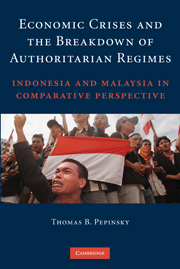 Economic Crises and the Breakdown of Authoritarian Regimes
Economic Crises and the Breakdown of Authoritarian Regimes Published online by Cambridge University Press: 21 January 2010
On October 13, 1997, the World Bank's representative in Jakarta, Dennis de Tray, remarked that “Indonesia is not Thailand.” The comment was supposed to inspire confidence in Indonesia's ability to manage the crisis sweeping through East Asian financial markets, drawing a sharp contrast between the rigidity of Thailand's political institutions and the flexibility of Indonesia's centralized political structure. Indonesia was in negotiations with the IMF, which would provide Indonesia with emergency funds and reassure foreign investors of the government's resolve to bring the economic troubles to a quick end. International media characterized Soeharto's decision to seek IMF aid as a positive, proactive step. Foreign governments worried about the Soeharto family's involvement in inefficient enterprises that the IMF sought to eliminate, but they remained optimistic that the agreement would help Indonesia, with its history of “sensible macroeconomic policies,” to return to healthy growth.
Indonesia completed the IMF agreement (IMF I) on October 31, 1997. Yet within weeks, troubling signs had emerged that suggested that the New Order would resist many of the conditions upon which the IMF and other foreign governments had insisted. Bank Indonesia (BI), the Indonesian central bank, raised interest rates sharply but shortly thereafter reduced them again. It further undercut its high interest rate policy by providing emergency liquidity support to troubled banks. In a bid to increase efficiency and without explicit deposit insurance, the Finance Ministry announced closures of sixteen small and troubled banks, but later allowed one to reopen under a new name.
To save this book to your Kindle, first ensure [email protected] is added to your Approved Personal Document E-mail List under your Personal Document Settings on the Manage Your Content and Devices page of your Amazon account. Then enter the ‘name’ part of your Kindle email address below. Find out more about saving to your Kindle.
Note you can select to save to either the @free.kindle.com or @kindle.com variations. ‘@free.kindle.com’ emails are free but can only be saved to your device when it is connected to wi-fi. ‘@kindle.com’ emails can be delivered even when you are not connected to wi-fi, but note that service fees apply.
Find out more about the Kindle Personal Document Service.
To save content items to your account, please confirm that you agree to abide by our usage policies. If this is the first time you use this feature, you will be asked to authorise Cambridge Core to connect with your account. Find out more about saving content to Dropbox.
To save content items to your account, please confirm that you agree to abide by our usage policies. If this is the first time you use this feature, you will be asked to authorise Cambridge Core to connect with your account. Find out more about saving content to Google Drive.